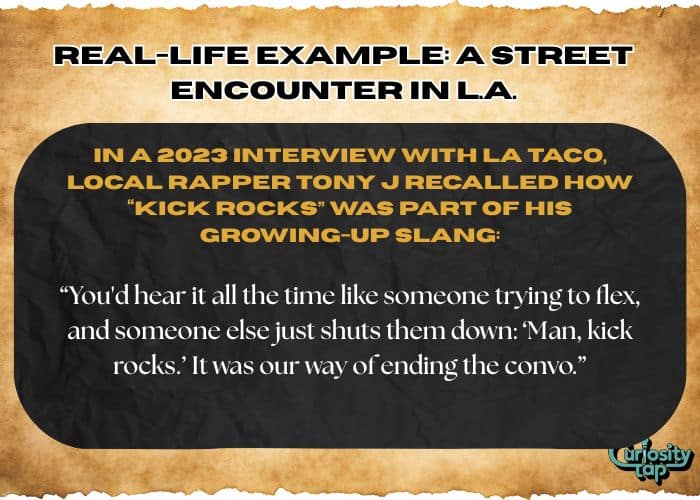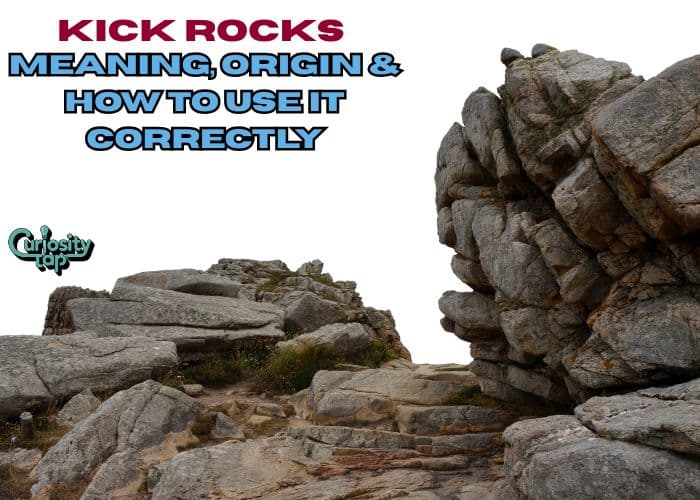Ever heard someone say “Go kick rocks!” and wondered what they meant or whether you should be offended or amused?
You’re not alone. This phrase has puzzled many, especially non-native English speakers or those unfamiliar with American slang.
The truth is, “kick rocks” isn’t just a quirky expression it’s a cultural idiom with attitude.
In this guide, we’ll uncover its true meaning, origins, real-life usage, and how to handle it like a pro, whether you’re decoding street slang or writing dialogue that sounds authentic.
What Does “Kick Rocks” Mean?
“Kick rocks” is an informal slang phrase typically used to tell someone to go away in a dismissive or annoyed manner. It’s similar to saying “Get lost” or “Buzz off” but often carries a more colorful or sarcastic tone.
Common Meanings:
- Dismissive Command: “Leave me alone.”
- Insult with Attitude: “You’re not welcome here.”
- Playful Banter: Used jokingly among friends.
🧠 Example:
“He kept asking for money until I told him to go kick rocks.”
Is It Always Rude?
Not necessarily. Context is everything. While often used in frustration, “kick rocks” can also be said jokingly between close friends especially with the right tone.
The Origin of “Kick Rocks”
From Literal to Figurative
The phrase likely emerged in mid-20th century American English, particularly from working-class or street communities.
The act of kicking rocks symbolizes a long, unpleasant walk something you might do if you’re told to leave and have nowhere to go.
According to Green’s Dictionary of Slang, “kick rocks” entered American vernacular around the 1950s, often with the implication of being cast out or told to scram (Green, 2010).
Pop Culture Influence
“Kick rocks” gained popularity through:
- Hip-hop lyrics
- Sitcom dialogue
- Teen dramas
- Urban storytelling
Its usage often signals authenticity or attitude, making it common in both entertainment and real-life urban conversations.
How to Use “Kick Rocks” in Real Life
✅ Appropriate Usage Examples:
- “If he doesn’t respect your boundaries, tell him to kick rocks.”
- “We’re done negotiating. You can kick rocks with your offer.”
- “He told the haters to kick rocks after the win.”
⚠️ When to Avoid:
- Formal settings (e.g., work emails, interviews)
- With elders or unfamiliar people
- In written communication unless it matches the tone

Real-Life Example: A Street Encounter in L.A.
In a 2023 interview with LA Taco, local rapper Tony J recalled how “kick rocks” was part of his growing-up slang:
“You’d hear it all the time like someone trying to flex, and someone else just shuts them down: ‘Man, kick rocks.’ It was our way of ending the convo.”
This kind of real-world example illustrates the phrase’s effectiveness as a boundary-setting tool in environments where brevity and street smarts are valued.
Quick Guide: “Kick Rocks” Alternatives
| Tone | Alternative Phrase | Usage Example |
|---|---|---|
| Rude | “Get lost” | “You’re annoying me get lost.” |
| Sarcastic | “Take a hike” | “You want a raise? Take a hike.” |
| Playful | “Scram” | “Scram, kid you botherin’ me.” |
| Formal | “Please leave” | “I’m asking you politely to leave.” |
Pros and Cons of Using “Kick Rocks”
✅ Pros:
- Adds streetwise authenticity
- Conveys emotion with few words
- Culturally relevant in urban settings
❌ Cons:
- Can be misinterpreted
- Inappropriate in formal scenarios
- May escalate conflicts if used harshly
Frequently Asked Questions (FAQs)
❓ What does “kick rocks” mean in slang?
“Kick rocks” means to go away, often rudely or dismissively. It implies the speaker wants the other person to leave.
❓ Is “kick rocks” offensive?
It can be, depending on tone and context. It’s usually informal and dismissive, but not a profanity.
❓ Can “kick rocks” be used humorously?
Yes. Among friends, it can be playful. Context and delivery matter greatly.
❓ Is “kick rocks” used outside the U.S.?
It’s primarily American, though it’s recognized in global English due to media influence.
❓ What’s the origin of “kick rocks”?
It likely comes from mid-20th century American slang, symbolizing someone walking away unhappily.
❓ Is “kick rocks” the same as “get lost”?
Yes, both mean to tell someone to leave, but “kick rocks” adds more flair and attitude.
Conclusion: Know When to Say “Kick Rocks”
Understanding slang like “kick rocks” helps you grasp not just language, but culture, tone, and social nuance.
Whether you’re watching a gritty Netflix series or navigating a conversation in New York or L.A., knowing when and how to use this phrase makes your English feel more authentic.
Next time someone’s pushing your buttons, just remember: sometimes, it’s okay to tell them to kick rocks with confidence.
🔗 Sources
Sources:
- Green, J. (2010). Green’s Dictionary of Slang. Chambers.
- Urban Dictionary. (2023). Kick Rocks Definition. Retrieved from https://www.urbandictionary.com/define.php?term=kick%20rocks
- LA Taco. (2023). Voices from the Streets: Slang That Defines LA. https://www.lataco.com/los-angeles-slang-phrases
Read more knowledgeable blogs on Curiosity Tap
Is this article helpful?

Jackson Pearson is a passionate educator and language enthusiast behind the blog Jackson Pearson. With years of experience in teaching and writing, he specializes in simplifying complex grammar rules, breaking down tricky vocabulary, and crafting learning guides that are both engaging and practical. His mission is to help readers boost their English skills whether they’re beginners or brushing up for fluency. Through every article, Jackson brings clarity, structure, and a spark of curiosity to the world of English learning.



